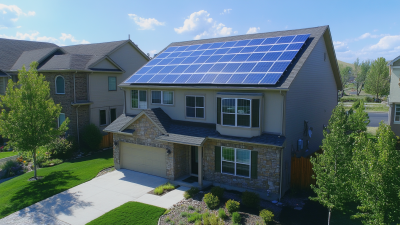5 Best Solar Systems that Will Power Your Home Efficiently
As the world increasingly shifts towards sustainable energy solutions, the importance of efficient home energy systems cannot be overstated. Solar systems have emerged as a leading choice for homeowners looking to reduce their carbon footprint and minimize electricity costs. According to the Solar Energy Industries Association (SEIA), the U.S. solar market grew by 167% in the last decade, reflecting the rising demand and technological advancements in solar energy solutions. Moreover, a report from the National Renewable Energy Laboratory highlights that residential solar installations can save homeowners an average of $20,000 over 20 years, making solar systems not just an eco-friendly choice, but also a financially sound investment. In this blog, we will explore the five best solar systems that will power your home efficiently, employing top strategies to maximize energy output and savings.

Selecting the Right Solar System: Key Metrics to Consider for Your Home
When selecting the right solar system for your home, several key metrics are crucial to maximize efficiency and energy cost savings. One of the primary considerations is the solar panel efficiency, which typically ranges from 15% to 22%. According to the National Renewable Energy Laboratory (NREL), higher efficiency panels produce more energy in less space, making them an ideal choice for homeowners with limited roof area. For instance, a high-efficiency panel of 300 watts can generate approximately 1,100 kWh of electricity per year, significantly reducing annual energy costs.
Another vital factor is the inverter type used in your solar system. String inverters are common and cost-effective, but microinverters or power optimizers can enhance energy production, especially for homes that experience shading throughout the day. According to a report by the U.S. Department of Energy, systems using microinverters can increase overall energy output by up to 20%. Additionally, considering your local solar irradiance, which refers to sunlight exposure measured in kWh/m² per day, will give you a clearer picture of potential energy generation. This data is important not only for understanding how much energy you might produce but also for evaluating the overall return on investment for your solar installation.
Comparing Efficiency Ratings: Understanding Solar Panel Performance Data
When selecting a solar system for your home, understanding the efficiency ratings of solar panels is crucial. Efficiency indicates how much sunlight a panel can convert into usable electricity. Typically, panels range from 15% to over 22% efficiency, meaning that higher-rated panels will generate more energy from the same amount of sunlight. This is especially important if you have limited rooftop space or want to minimize installation costs with fewer panels.
One tip for maximizing solar panel performance is to consider both the efficiency and wattage of the panels. A high-efficiency panel with lower wattage may perform better in shaded conditions compared to a lower-efficiency panel with higher wattage. Additionally, check the temperature coefficient rating; this indicates how well the panel performs in high temperatures, which is vital for ensuring longevity and consistent output in warmer climates.
Lastly, don't overlook the inverter type in your solar system. String inverters are common, but microinverters can offer better performance for systems with multiple panels facing different directions. This can enhance overall energy production and ensure that you'll get the most out of your investment in solar technology.
5 Best Solar Systems that Will Power Your Home Efficiently
| Solar System Type | Efficiency Rating (%) | Wattage (W) | Battery Storage (kWh) | Warranty (Years) |
|---|---|---|---|---|
| Monocrystalline | 22.0 | 300 | 10 | 25 |
| Polycrystalline | 18.0 | 250 | 8 | 20 |
| Thin-Film | 13.0 | 200 | 6 | 15 |
| Bifacial | 21.0 | 350 | 12 | 30 |
| Building-Integrated | 15.0 | 180 | 5 | 25 |
Cost Analysis: Evaluating the ROI on Solar Systems for Homeowners
As homeowners increasingly turn to solar energy, evaluating the return on investment (ROI) for solar systems becomes paramount. With the
solar charge controller market projected to expand significantly from
$182,160 in 2024 to $2.828 billion by 2031, there is a growing focus on the financial implications of solar installations. Homeowners often wonder about the time it will take to recoup their investment. Experts suggest that a realistic payback period for residential solar systems hovers around eight years. This period can be shorter for households with high electricity consumption, making solar power an attractive option for energy savings.
The installation of solar systems not only assists in reducing energy costs but also enhances property value, which can be beneficial during property tax assessments. However, homeowners in regions like New Jersey must be aware of how certain renovations can impact property taxes. Choosing between selling a home or efficiently upgrading an existing space is a common dilemma faced by residents. Ultimately, the decision to install solar panels should be accompanied by a thorough assessment of potential financial benefits, ensuring that each homeowner can make an informed choice that aligns with both their budget and energy needs.
Inverter Technologies: How They Impact Your Solar Power Efficiency
When it comes to harnessing solar energy efficiently, one of the most crucial components is the inverter technology employed in solar power systems. Inverters play a pivotal role in converting the direct current (DC) generated by solar panels into alternating current (AC) that can be used to power your home appliances. The type and quality of the inverter can significantly influence the overall efficiency and performance of your solar system.
There are various inverter technologies available today, including string inverters, microinverters, and power optimizers. String inverters are often more affordable and simpler to install, but they can be less efficient in setups with shading or varied panel orientations. On the other hand, microinverters work at the individual panel level, allowing for better energy extraction even if some panels are obstructed. Meanwhile, power optimizers can enhance the performance of string inverters by maximizing each panel's output.
Understanding these technologies empowers homeowners to choose a solar system that not only meets their energy needs but also operates at maximum efficiency.
Environmental Benefits: Quantifying the Carbon Offset of Solar Energy Use
The adoption of solar energy systems in residential homes is not just a personal commitment to reducing utility bills;
it's an impactful stride towards environmental sustainability. Recent studies indicate that every kilowatt-hour (kWh) of solar energy produced
can offset approximately 0.85 pounds of carbon dioxide emissions. Given that the average American home consumes approximately
877 kWh per month, switching to solar can result in a staggering reduction of nearly
900 pounds of carbon emissions annually, aligning with data from the
U.S. Environmental Protection Agency.
Moreover, the long-term benefits multiply significantly when considering widespread adoption. According to a report by the
National Renewable Energy Laboratory, if just 10% of U.S. households
installed solar panels, it could lead to a reduction of over
30 million tons of greenhouse gases each year. This monumental shift would not only mitigate the impacts of climate change
but also contribute to improved air quality and public health, which are vital for sustainable community living.
Embracing solar energy systems therefore represents a dual win: fostering individual energy independence while simultaneously
reducing the carbon footprint on a national scale.
Related Posts
-

Ultimate Checklist for Choosing the Best Solar Systems: Key Metrics and Expert Insights
-

Innovative Approaches to Optimize Your Solar Solutions
-

Emerging Trends in Solar Technology Innovations for the Best Solar Systems by 2025
-

Navigating Import Export Certifications for the Best Solar Energy Products Worldwide
-

Understanding the Best Water Solar System: How It Works and Its Benefits
-

Exploring Alternative Solutions: Top Solar Water Pump Options for Efficient Irrigation
Contact Details
Address:
Solar Pump Solutions,
Borrisokane, Co. Tipperary, Ireland.
